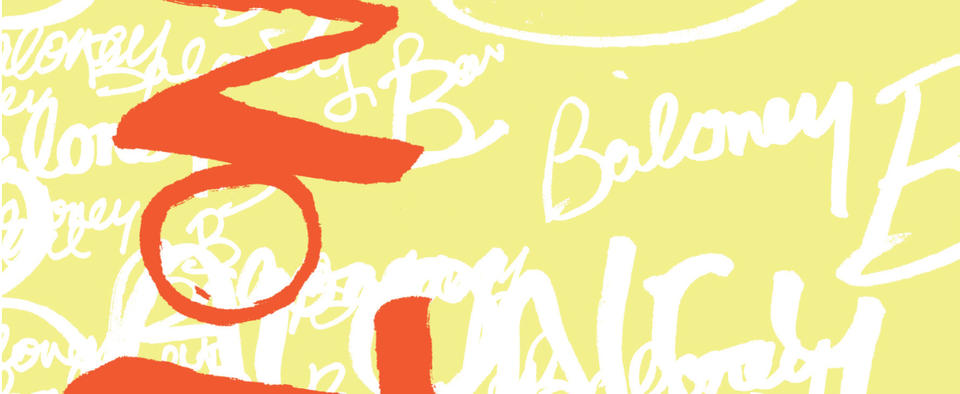
The difficult art of slicing processed meat with a prehistoric tool
On choosing the right translated title
Soon after translator Pablo Strauss approached me with the project of translating my first book, a collection of stories entitled Atavismes, we dove in and ended up with what I thought was an amazingly similar book. The distinctive voices of its thirteen idiosyncratic narrators remained in the new language. All of it was familiar to me, but in an odd way, like if the same consciousness had been channelled in another reality. Still, among these thirteen propositions, there was a slight titular difference: the story «Effacer le tableau», in which disorganized revolutionaries destroy the most important pieces of art in a museum while trying to save them, couldn’t become the literal ‘Erasing the Painting’ or ‘Erasing the Picture’, nor the more idiomatic ‘Cleaning the Slate’. There was something untranslatable there that needed to be reinvented. Pablo offered the name of the iconic 1957 Paul-Émile Borduas painting heroically massacred in the story: «L’étoile noire» – ‘Black Star’. Perfect! The new title focused on a pivotal scene in the story, closer to the action and characters, making their quest (and their failure) more concrete. It was only one title out of thirteen, a slight difference hidden inside the book, which remained Atavisms in translation. The intriguing singularity of this seldom used word, its conceptual strength in regard to the book – tying all the historical, cultural and more intimate, familial aspects of the stories together – and that it has the same meaning in either language, were good reasons to keep it.
But oftentimes books themselves have to be renamed for different reasons, and the reading experience as a whole is modified: do these books with distinct titles tell the same story? Can a title change also change the form? For example, interesting semantic shifts occurred among translations of André Alexis’s Fifteen Dogs. French translations were made simultaneously by two publishers one in Québec, one in France. Comparing them is a strange experience. In my opinion, each version is reliable in comparison to the English original, but put side by side they are destabilizing. Not one sentence is identical. Slightly different substantives and adjectives, another grammar, inverted sentences, commas instead of full stops, etc. It’s another voice telling the same story. Same difference, one would say. To decide which version is best, you’d need a memo on the proper choice of synonyms in the act of translating. But the most interesting thing about Alexis’s book is that the French versions have totally different titles. Neither became Quinze chiens, but rather Le langage de la meute (literally The Language of the Pack) in the Québec version, and, in the French version, Nom d’un chien (the literally meaningless Name of a Dog, an expression of surprise or discontent that could be something like ‘For God’s sake!’ or ‘Dammit!’). The first points directly to the story, in a sober way: here is a group of dogs given the faculty of speech. The second stresses the comical potential of the gods’ intervention and the playfulness of Alexis’s writing. Both reveal something of the book, but I must say that,I really prefer the Québec title for its simple poetic beauty, for what the very idea of speech puts into question in this fictional setting: what will this pack of dogs reveal about us mortals that we can’t grasp with our own words? Alexis doesn’t lack humour but his book is certainly not the farce the second title suggests: in Québec, Nom d’un chien would better fit a burlesque boulevard theatre play. Plus, the expression is totally obsolete – I’ve never heard it actually spoken in my life, unironically. You might pick up this same story on Montréal or Paris bookstore shelves, but depending on the title you would surely approach it in a very different way.
As a writer I know choosing a title is not so simple. Sometimes you stick to your first intuition and in the end it still works fine. Other times you’re without a clue, but one Thursday morning while drinking too much coffee the perfect words epiphanically arrive. Still, other times you have to dig for it. When it comes to translation you have to rethink everything: you’re creating, in many ways, another book. So how did the title of my novella Des lames de pierre change to the distant Baloney in its English translation?
Last Spring, Pablo and I were having breakfast in a Montreal restaurant with Coach House editor Alana Wilcox, talking about the book and figuring out what it meant to each of us prior to the editing process. It was the first time I had met Alana and I was a little stressed because I hadn’t spoken English for years, hoping my friendly Montréal accent would make the project all the more sympathetic to her. I drank a lot of coffee. The accent was doing fine. We had no problem getting into the story of poet Robert ‘Baloney’ Lacerte, a sad but beautiful one, easy to relate to if you’ve attended open mic readings, befriended poets, or wrote a verse or two at some point in your life. Even if you’ve never done any of these things, you’ve seen many people just as lonely on the street, at the mall or in a park. Some acted so strangely you quickly changed direction, some you tried to ignore as casually as possible, others were so silent and discreet you almost didn’t notice them. You know too well the kind of absence of which Robert’s loneliness is made. There are so many truths he told the young narrator about that whether he actually lived them or not is irrelevant. What’s important is how they spoke together. It’s the door they opened to share their loneliness. On this we all agreed. So what to do with the title? I had thought we were going for Stone Blades. Translates perfectly, two words, brief, and, just as in French, it’s the exact scientific term for the artifact. We ordered more coffee.
When we agreed on Des lames de pierre, my editor at Le Cheval d’août, Geneviève Thibault, said it was a choice in opposition. I had in mind a number of syntagms with ‘Baloney‘ in them, but for many humorous reasons, it wasn’t a good idea to use any when one of the most highly praised novels in Québec at that moment was Alain Farah’s Pourquoi Bologne. I had to find something else, something that reflected my feeling that the most important topic of the book was not failed poetry, but the one that shapes its very form: failing memory. No new title came to me immediately, so for this one, I had to dig. As a reader I love to be put to the test with riddles, formal puzzles, or unanswerable questions, so I reread the whole book once more looking for clues I had left behind as a writer. I found the metaphor in the middle of the book, in one of its most important moments, when Robert is brought back to himself by a violent thunderstorm, knee deep in muddied water after wandering in limbo for years: memories are eroded artifacts, a past which can only be reconstructed partially, leaving us with so many gaps and blind spots that either remain empty or are filled by invention, by narration, by extrapolation.
As a writer, I love to challenge the reader. Titles can be used, voluntarily, as barriers. There are many possibilities with Atavismes. If you know what it means, you’ll think Zola and know right away there’ll be social and family matters, and probably many people smelling bad. If you don’t, you either put the book down thinking this isn’t for you, or you’re intrigued, then google the word and start reading the book to figure out what the hell is happening in there. With Des lames de pierre, that’s what I was offering readers. Why don’t you come in and figure this out with me? It is, in many ways, a serious title, one that doesn’t reveal itself easily. Alana and Pablo conceded it did work as a concept, but with a title there are many things you can do. This idea of memory as an artifact is not a conceit in the book, but a flash appearing only once on account, literally, of a lightning bolt. It’s a rather abstract concept, they said, but you have a strong main character, and there are powerful scenes in the book, so why don’t we brainstorm something else, just for fun? Well, I answered, my working title was Baloney. Their immediate enthusiasm surprised me, but it felt so right. We were going back to my first intuition. In French, the title would have, of course, focussed on the main character, but the meaning of the word is pretty much limited to ideas of poverty and improper nutrition. This would have put too much emphasis, in a potentially sarcastic way, on Robert’s hard life. In English, the word has a funny edge, but also presents the idea of phoniness, of deceptive talk, hence the questions the book asks all along: How can you tell your life to a stranger? What actually happened during those six or seven years you only remember a handful of events from? How can you contort reality when writing a biography? With one short, intriguing word, we had both hero and form.
But still, I had a doubt. Wait, I said. I heard that Farah’s Pourquoi Bologne was recently translated. We should check it out. Pablo picked up his phone: Well, he said. They changed it to Ravenscrag… For the rest of the meeting, I ordered decaf.

